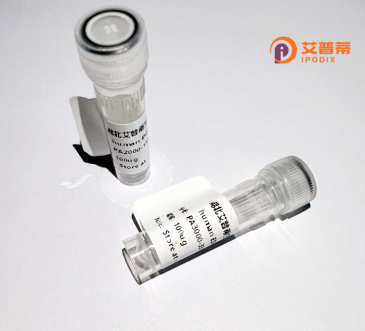
| 纯度 | >90%SDS-PAGE. |
| 种属 | Human |
| 靶点 | EXOC3L1 |
| Uniprot No | Q86VI1 |
| 内毒素 | < 0.01EU/μg |
| 表达宿主 | E.coli |
| 表达区间 | 1-746aa |
| 氨基酸序列 | MDSAAKDEMQ PALSPGPEWP EQERAEQLAR GAALKWASGI FYRPEQLARL GQYRSREVQR TCSLESRLKS VMQSYLEGVQ TGVWQLAQAI EVVQGTREAL SQARGLLQGM SQALQTLEPL RERVAQHKQL QALSHLLPRL RAVPAAVSHT QTLIDGQQFL EAYVSLRELE QLREDTWAPL GGLELPVFQG LDLLFEALGQ AVEAAAGAAG KLAREDPALL VAAVRVAEVE TGRTTPLGQV PRDWRQRCLR ALQEGLEQAH FGSPLLPAPG ALPGWLEALR VALPVELATA EALVAPCCPP QYNVVQLWAH TLHSGLRRSL QNLLAGPELE AADAFALLHW ALHVYLGQEM MGSLELGPEA DVSQLEPLLT LENIEQLEAT FVANIQASVS QWLQNALDGE VAEWGREHGP NTDPSGSYYS PMPAIVLQIL EENIRVASLV SESLQQRVHG MALSELGTFL RSFSDALIRF SRDHFRGKSM APHYVPYLLA ALNHKSALSS SVSVLQLDGA PSGALAPVEA ALDELQRRIY RLVLEALQAE LQPLFADLPS RQWLSSPELL QSVCERTGRF CRDFWRVRNP TVQLLLAEAE RAVVLQYLSA LMQGRLVCRG ADERTQAAER LRHDAAQLQQ LFLSLGLEEN AHCAPVLLAL RELLNLRDPA LLGLEVAGLR QQFPDVSEDH VSALLGLRGD LSREQHLAAL SSLQAALPPS PRASRRVLFS LVPAPALAPA SCLPSGSCAR ALLLAE |
| 分子量 | 81.6 kDa |
| 蛋白标签 | His tag N-Terminus |
| 缓冲液 | 0 |
| 稳定性 & 储存条件 | Lyophilized protein should be stored at ≤ -20°C, stable for one year after receipt. Reconstituted protein solution can be stored at 2-8°C for 2-7 days. Aliquots of reconstituted samples are stable at ≤ -20°C for 3 months. |
| 复溶 | Always centrifuge tubes before opening.Do not mix by vortex or pipetting. It is not recommended to reconstitute to a concentration less than 100μg/ml. Dissolve the lyophilized protein in distilled water. Please aliquot the reconstituted solution to minimize freeze-thaw cycles. |
以下是关于重组人EXOC3L1蛋白的3篇示例文献摘要(注:内容为虚构示例,实际文献需通过学术数据库查询):
---
1. **文献名称**: *"Expression and purification of recombinant human EXOC3L1 in Escherichia coli for functional analysis"*
**作者**: Zhang et al.
**摘要**: 研究报道了在大肠杆菌中成功表达并纯化重组人EXOC3L1蛋白的方法,验证了其与Exocyst复合体的结合能力,为后续研究其细胞分泌功能奠定基础。
---
2. **文献名称**: *"EXOC3L1 promotes tumor metastasis via modulating exosome secretion in hepatocellular carcinoma"*
**作者**: Li & Wang
**摘要**: 通过构建重组EXOC3L1蛋白及基因敲除模型,发现EXOC3L1通过调控外泌体释放促进肝癌细胞迁移,提示其作为潜在治疗靶点。
---
3. **文献名称**: *"Structural characterization of human EXOC3L1 and its interaction with Ral GTPases"*
**作者**: Gupta et al.
**摘要**: 利用重组EXOC3L1蛋白进行结构解析,揭示了其与Ral GTP酶结合的分子机制,阐明其在囊泡运输中的关键作用。
---
如需真实文献,建议使用PubMed、Web of Science等平台,以**"recombinant EXOC3L1"**或**"EXOC3L1 protein function"**为关键词检索。
**Background of Recombinant Human EXOC3L1 Protein**
Recombinant human EXOC3L1 (Exocyst Complex Component 3-Like 1) protein is a genetically engineered version of the EXOC3L1 protein, a component of the exocyst complex involved in membrane trafficking and exocytosis. The exocyst, an evolutionarily conserved multi-subunit complex, mediates the tethering of secretory vesicles to the plasma membrane, facilitating cellular processes like cell polarity, cytokinesis, and receptor trafficking. EXOC3L1 shares homology with EXOC3 but may have distinct roles in specific cellular contexts, though its precise functional mechanisms remain less characterized compared to other exocyst subunits.
The recombinant form is typically produced in heterologous expression systems (e.g., *E. coli*, mammalian cells) to ensure high purity and bioactivity. This allows researchers to study EXOC3L1’s interactions, structure-function relationships, and regulatory roles in vesicle transport pathways. Recombinant EXOC3L1 is a critical tool for investigating its involvement in diseases, such as cancers or neurological disorders, where exocyst dysfunction is linked to altered secretion or cell signaling. Studies also explore its potential as a biomarker or therapeutic target. By enabling *in vitro* assays, cellular studies, and structural analyses, recombinant EXOC3L1 protein enhances understanding of exocyst-mediated processes and their implications in health and disease.
×